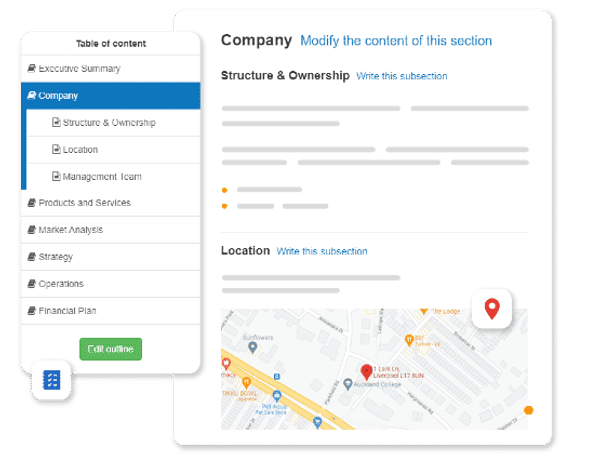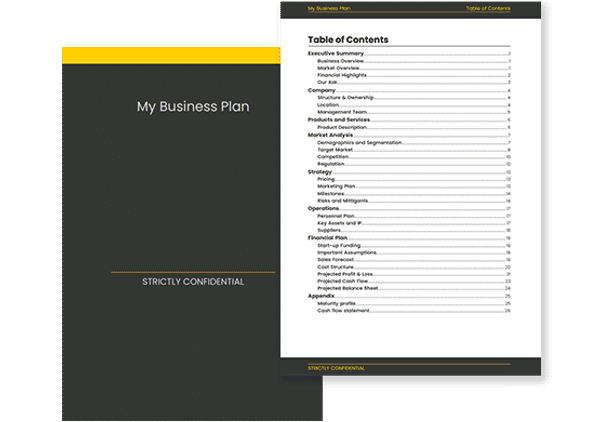1. What is market analysis?
Definition and key uses of market analysis
Market analysis is the process of gathering, analyzing, and interpreting data about a particular market. It involves looking at both the demand (customers) and supply side (your competitors), and the industry as a whole (regulation, supply chain, etc.).
Conducting a market analysis helps businesses like yours achieve the following objectives:
- Position the business with a concept that is likely to be popular within your chosen location, and yet differentiated from competition
- Evaluate the commercial potential for your business on the local market - how much sales can you generate in the coming years?
- Gather the data necessary to start using the market analysis by developping a concrete business plan for your venture
For startups and existing businesses alike, conducting regular market analysis can help reduce many of the risks associated with running a business.
This is because you'll be asking yourself key questions such as which customer segments are best to target, what services to offer to meet their need, and how to gain and defend market share from competitors.

2. Steps & tips to do a market analysis
What are the key steps in market analysis?
There are five key steps in market analysis. Let's take a look at each one in more detail.
- Current industry trends and regulations: understanding how trends are evolving and regulation is changing helps you identify the direction in which the market is moving and any legal or compliance factors that may impact your business.
- Demand in your serviceable area: this involves analysing whether there is demand for your products or services in your chosen area. It helps you assess whether there is a sufficient market for your offerings. It involves researching potential customers, their needs, and purchasing behavior. Related: what is TAM SAM SOM.
- Direct and indirect competition: this involves evaluating both direct competitors and indirect competitors. Doing so helps you understand the competitive landscape, verify that the market is not saturated and identify potential gaps or niches to exploit.
- Unique Selling Proposition (USP): this involves developing a point of difference to set your business apart from competitors. Why should customers choose your products or services over others in the market?
- Validate the USP or new positioning: once you've identified your USP or new positioning, it's important to validate it with your target market. This can involve conducting surveys, focus groups, or other research methods to ensure that your USP resonates with potential customers and meets their needs.

3 tips for more impactful market research and analysis
Primary research (data collected firsthand) is likely to be of greater importance to your business than secondary research. You should perform extensive research on customers, suppliers and competitors in your local or addressable market to form an accurate picture of the overall market.
Whilst secondary research (existing data and reports) may not always be totally up-to-date, it can provide valuable context and save time and resources. Using secondary research to supplement your primary research is perhaps the best way to go about it.
Document your market analysis findings in your business plan as this helps demonstrate to investors and lenders that you understand your market well.

3. Market analysis and business planning
Business planning is the logical next steps after market analysis
Market analysis is a vital routine for both small and large businesses. It's necessary when they start, expand into new markets, launch new products or services, or just to stay updated and competitive.
In order to use the results of a market analysis and make it actionable, the next step is to start creating a financial forecast to assess how much sales and profit the business is likely to make in the years to come.
Multiple scenarios can be brainstormed until you start forming a view of what is going to be the central case in your business plan.
Depending on your circumstances, the business plan can be used internally, or used to secure funding from investors or lenders.
A fully fledged business plan written to secure financing will contain a dedicated market analysis section in which you should include comprehensive information about your target market, competitors and trends amongst other things.

How a platform like The Business Plan Shop can help you write a professional business plan
The Business Plan Shop helps businesses like yours make smart strategic decisions by providing tools for business planning, budgeting, forecasting and analyzing financial performance.
Using a platform like The Business Plan Shop is usually the next logical step after completing market analysis as the data is used as a key input during the business planning and forecasting processes.
We help you write a business plan by providing guidance at every step, through examples, instructions, ensuring your plan follows the structure investors & lenders expect. You'll also be able to plan growth, anticipate future cash flows with confidence and check that you are on track to deliver your forecasts.

Frequently Asked Questions About Market Analysis
Market analysis is the process of gathering, analyzing, and interpreting data about a particular market.
Here are some of the key reasons as to why market analysi is important for your business:
- Understanding customer needs: market research and analysis help you gain insights into your target customers' needs, preferences, and behaviors. This information allows you to tailor your products or services to meet customer demands more effectively.
- Identify gaps in the market: it allows you to identify underserved customer segments or geographical areas.
- Analyse competiton: market analysis helps you assess your competitors, their strengths, weaknesses, and strategies. This knowledge enables you to differentiate your business and develop a competitive advantage over time.
- Set realistic goals: knowing where your market is headed helps set realistic goals for your business that you can achieve and aim towards within the next 3 or 5 years.
- Reduce risk: market research can help prevent costly mistakes. It allows you to test concepts and ideas before committing significant resources, potentially saving time and money.
Ultimately, it helps you make informed decisions, reduces risks, identifies opportunities, and contributes to the long-term success and sustainability of your business.
There are four key approaches to market research: primary, secondary, quantitative and qualitative.
Let's look at each one in more detail:
- Primary research: this involves collecting data first-hand, usually from individuals or groups. It is valuable for obtaining data tailored to your research objectives and can provide fresh insights. Common methods of primary research include surveys, interviews, observations, and focus groups.
- Secondary research: collates existing information or research for analysis. The main benefit of this is that it can be cost-effective and time-saving as it relies on already available data sources like market reports, industry publications, academic studies and government statistics.
- Quantitative research: this focuses on collecting and analyzing numerical data to quantify relationships and patterns. It usually involves structured surveys, questionnaires, experiments, and statistical analysis. The main aim is to measure specific variables test hypotheses, generalize findings to a larger population and provide precise, numerical results that are often used for statistical analysis.
- Qualitative research: emphasizes understanding behaviours, attitudes, motivations, and perceptions through non-numerical data. In-depth interviews, focus groups and content analysis are three common examples of qualitative research. This method aims to extract information about what people think and why they hold that opinion.
Using all four research approaches together can provide a more comprehensive understanding of the overall market and increases the likelihood that your conclusions are accurate.
Market research and market analysis are related but distinct processes used by businesses to understand and evaluate market conditions, opportunities, and potential strategies.
Let's take a look at each of them in detail:
- Market research focuses on gathering data related to a specific market, including its size, demographics, trends, customer preferences, competition, and more. It involves both primary and secondary research and is typically conducted as a preliminary step.
- Market analysis is the process of evaluating and interpreting the collected market research data to make informed business decisions. It is, therefore, the next step after conducting market research. It focuses on the analysis of data, drawing conclusions, and developing strategies based on the insights obtained from market research. Unlike market research, market analysis is a key section of any business plan.
In summary, market research is the process of gathering data and insights about a market, while market analysis involves interpreting that data to make strategic decisions. Both are integral to the development of a business plan, with market analysis being a core component used to create a strategic roadmap for a business.
Whether or not you need to hire a market research company as a business depends on various factors, including your specific research needs, available resources, expertise, and the complexity of the research required.
Here are some considerations to help you decide:
- Nature and scope: assess the nature and scope of your research needs. If you require in-depth, specialized, or large-scale market research that is beyond the capabilities of your internal team, hiring a market research company with expertise in your industry or area of interest may be beneficial.
- Expertise: consider the expertise and experience of your internal team. If your team lacks the necessary skills and knowledge to design and execute effective market research studies, it may be advantageous to bring in external experts.
- Loss of control: on the flip side, when you hire an external research company, you are relinquishing some control over the research process. You may not have direct oversight of every aspect of the study, which can lead to concerns about the quality of the data collection and analysis.
- Cost: hiring a market research company can often be very expensive and is probably unfeasible for the vast majority of small businesses.
Overall, hiring a market research firm has its advantages, though it's generally not something small businesses do, and it's important to weigh up the potential benefits against the drawbacks and costs involved before making a decision.
Try The Business Plan Shop for free!
Have your market analysis ready? It's time to put it to use inside The Business Plan Shop: create a financial forecast to form a view on the sales potential for your business today.
Free 7-day trial. No credit card required.

